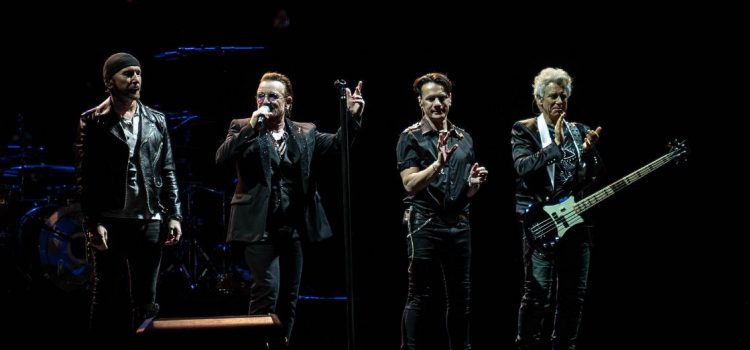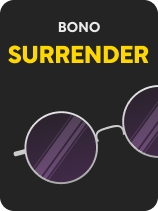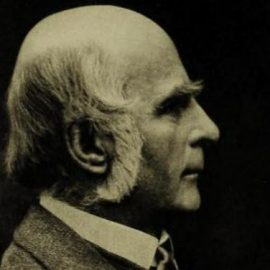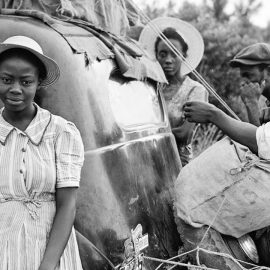

This article is an excerpt from the Shortform book guide to "Surrender" by Bono. Shortform has the world's best summaries and analyses of books you should be reading.
Like this article? Sign up for a free trial here.
When did U2 form as a band? What has their journey to fame been like?
U2 formed in the late 1970s and continued producing music for the following four decades. In his memoir Surrender, Bono discusses the history of the band and how they grew to what they are today.
Read on to learn about the early days of U2 and how their band has developed over time.
U2’s Early Days
When did U2 form? U2 first appeared on the music scene during the late ’70s heyday of punk rock, hard on the heels of bands like the Sex Pistols and the Ramones. In his memoir Surrender, Bono writes that he remembers feeling particularly energized by the raw simplicity of the Ramones’ music—in fact, U2 won their first TV gig by performing a Ramones song as their audition. However, Bono felt they were a stronger band whenever they played songs they’d written themselves. They did so in rehearsals, first in their school’s music room and later in a shed at the cemetery where Bono’s mother was buried.
(Shortform note: The punk rock movement began in the 1970s as a back-to-basics reaction against the overly slick pop music of the era. Though its flagship bands were certainly the US’s Ramones and the UK’s Sex Pistols, the trappings and attitude of punk rock can be traced back to 1967’s The Stooges, led by front-man Iggy Pop. Punk rock features short, simple, fast-paced songs with minimal production values—music that can be played on the instruments available to high school and college students practicing in their family’s garage—or, in the case of U2, a shed. Beyond its simplicity, punk rock in the ’70s became known for tackling political topics with an anti-establishment mindset that mainstream music steered away from.)
In 1979, Bono and Ali traveled to London to give copies of U2’s first demo tape to record companies and music journalists. They did this mostly by pretending to have appointments just to get their foot in the music industry’s door, and their work was rewarded with positive write-ups in several music magazines. U2 followed up with a tour of London clubs, which met with mixed results—Bono writes that music critics seemed to enjoy the band’s music, but record company scouts always caught their worst shows. In the end, U2 returned to Ireland without the record contract they’d hoped for.
(Shortform note: The period in which Bono writes that U2 tried to break into the music business is sometimes referred to as the Album Era of rock, when 12-inch long-playing records (LPs) were the dominant format of the recording industry, as opposed to 7-inch “singles” with one song per side, which were popular in the 1950s. A standard record deal for a band like U2 would have granted royalties of about 10% of the wholesale price of each album sold. At the time, a recording contract was essential for musicians to reach a wide audience, but with the birth of digital music and streaming, artists can now distribute music online without a corporate intermediary, upending the business model that U2 grew up with.)
At the start of 1980, Bono felt like a failure, and the other band members questioned whether they should keep going or find “real jobs” instead. However, the band didn’t give up. On the strength of their positive reviews for shows in London, they went on tour in Ireland with their last show—offered for free—at the National Stadium in Dublin. Bono recalls that he and the band gave their all during that final performance. As luck would have it, a representative from Island Records was there, and he offered U2 a record deal on the spot—a contract that would lead to their first album, Boy, as well as their first music video, filmed for the song “I Will Follow.”
(Shortform note: The performance at Dublin’s National Stadium that Bono says won the band their recording contract wasn’t just free for in-person attendees, but was also broadcast on the radio and later circulated as a bootleg recording. Island Records, the label that signed U2, began in 1959 by producing albums by Jamaican reggae performers before branching out into other musical genres. Before adding U2 to their roster, Island’s other famous artists included Cat Stevens, King Crimson, and Bob Marley. Though U2 would temporarily leave Island Records in 2006, citing a lack of care and attention by the company’s management, they returned to Island in 2013 and have remained with the record company ever since.)
The Art of Music
Instead of being a musical flash in the pan, U2 would persevere and succeed as a band for over four decades. Bono argues that he’s persisted for that long because he’s driven by the need to express himself through music, even though he questions himself and sometimes feels like a fraud. Bono describes the anxiety he feels as a performer and songwriter, the value of music as a means to send a message, and the ugly business aspects that artists must consider when protecting their work.
Bono struggled with self-doubt throughout his musical career. On U2’s first record, he was anxious about the lyrics, which he felt were all less than what they could have been. His anxieties emerged during U2’s early shows—did he really fit in with the angry, rebellious British music scene of the time? After every concert, the band held a meeting to discuss what went right and wrong. In his memoir, Bono chides himself for berating his bandmates, though they often did the same to him regarding his on-stage antics. Bono admits to being an overly showy performer, partly to draw attention to himself and partly to hide behind a mask.
(Shortform note: The self-doubt, insecurity, and general feelings of not fitting in that Bono describes in U2’s early days are hallmarks of what psychologists call impostor syndrome, a form of anxiety that many people experience after achieving success but not feeling successful. People in the creative arts are especially prone to impostor syndrome, both because their work is open to public judgment and because of how easy it is to compare your own work to others you admire. For some, like Bono, impostor syndrome can manifest as perfectionism—a feeling that nothing is ever good enough and can be made to be better.)
Bono’s always considered his chief songwriting talent to be finding the primary musical line and highlighting the central message of a song. One example Bono gives is that of “Sunday Bloody Sunday,” which the band wrote as a protest song against Ireland’s political violence. Because Bono feared the song might be co-opted by the rebel groups they were protesting, he’d shout “this is not a rebel song” and rip an Irish flag onstage. While this angered some groups within Ireland, it made the message of the song very clear.
(Shortform note: Despite being inspired by a specific historical event, the Bloody Sunday massacre of 1972, the song’s continued relevance to modern political violence has kept “Sunday Bloody Sunday” alive in the public consciousness. By infusing political messages in his lyrics, Bono joins a long and storied tradition of blending rock music and politics, from the counterculture movement of the 1960s to later artists such as N.W.A. and Rage Against the Machine. In general, songwriters such as Bono come across as more authentic in their political messaging when they have a personal understanding of the issues they address, such as U2’s up-close experience with sectarian violence.)
In addition to protecting the meaning of their music, Bono also writes about the importance of protecting the music itself. In their original record contract, U2 accepted less pay and royalties in exchange for retaining full copyright of their music. Though beneficial for artists in the long run, this sort of deal isn’t the industry standard—many artists give up their copyright protection in exchange for higher upfront profits and end up regretting it later in life, when their record companies profit off their songs with only a pittance going to the artists. Bono’s regret later in his career is that he hasn’t been able to use U2’s influence to improve the legal landscape for musicians in general.
(Shortform note: While Bono laments that U2’s copyright deal hasn’t served as a model for other artists, contemporary pop star Taylor Swift has adopted a game-changing approach to reclaiming copyright that may benefit other musicians as well. At the age of 14, Swift signed a deal that gave her record label the rights to her first six albums. When that company was sold in 2019, the rights to her music went with it. Swift was never given the chance to buy back her original recordings, but since she’d retained the copyright to the composition of her songs, Swift has begun rerecording and reissuing her older albums under her new record label, with the addendum “Taylor’s Version” to each album’s title to let fans know which edition they’re buying.)
Rock Stardom
For good or ill, the side of the music business that the public is most aware of is the fame and recognition that comes with success. For Bono, the first decade of U2’s rock stardom—a time he equates to U2’s “teenage years” as a band—opened his eyes to a much wider world. He describes the joys of connecting with an audience during a live performance, the privilege of seeing the world from a rock star’s perspective, and how this experience culminated in the recording of U2’s breakout album, The Joshua Tree.
U2 embarked on their first European tour, and Bono describes how every show was a communal experience in which the audience played as big a role as the band. U2 was catching the energy of the punk rock movement, but where punk was cynical at heart, U2’s early music was a celebration of innocence. Bono says that in the magic of a great concert, he wouldn’t just lose himself in the music; he’d enable the audience to do so as well. It was more than just playing well on stage—when the band could truly connect with the crowd and spark the current of excitement running through them, everyone in the room would have a heightened experience almost like a shared state of flow.
(Shortform note: The heightened “flow state” that Bono mentions was first identified by psychologist Mihaly Csikszentmihalyi. When in flow, you become fully engrossed, lose track of time, and lose yourself in the process, exactly as Bono describes. While fans may be aware of the differences between a band’s live performance and a studio recording, from the musician’s point of view, each requires a different skill set. Live performance requires improvisation and showmanship, whereas recording focuses more on composition and musical precision.)
In addition to the joy of live performing, Bono recalls the childlike excitement of traveling the world for the first time and experiencing the best that Europe had to offer—all at the record company’s expense. After Europe, the band toured the United States, which overwhelmed Bono with its diversity and size. To make an impact in the US, where they’d yet to have a hit song, the band strategically bypassed college music venues, where the crowds were essentially transient, in favor of playing for local audiences where they might build a following in America’s heartland.
(Shortform note: While Bono discusses touring in a generally positive light, that isn’t the experience of all performing artists. In The Woman in Me, singer Britney Spears describes her concert tours as particularly grueling. According to Spears, there were many times in her life when she should have slowed down and pulled back from the concert circuit to tend to her physical and mental health, but the pressures of the music industry wouldn’t let her. Spears also observes that male performers, such as those in U2, are afforded more leeway and freedom from scrutiny than female artists when they go on tour.)
U2 toured and recorded throughout the 1980s, producing four more albums after Boy, including their landmark 1987 album The Joshua Tree. Bono says that the songs on the album reflect his Irish view of America and its dualities—the imaginary land of opportunity and promise versus the real-world place with its problems and its dark side, as shown most clearly in the song “Bullet the Blue Sky.” Bono says that recording the album was a joyous time for the band, and The Joshua Tree’s success rocketed U2 to a new level of superstardom. After finishing the tour that coincided with the album, the whole band moved to Los Angeles for a time as a way of celebration—their last wild, youthful party before it was time to finally grow up.
(Shortform note: U2’s fascination with the US has continued to the point that in 2018, Forbes Magazine suggested that U2 was perhaps the best American rock band. In 1987, when U2’s popularity in the US skyrocketed, they caught the attention of the mainstream news media, not just the music industry press. In an echo of the 1960s’ “British Invasion,” when the Beatles and the Rolling Stones took over the American airwaves, U2 influenced many bands that followed and opened the door for other Irish artists such as the Cranberries, Snow Patrol, and the Corrs.)

———End of Preview———
Like what you just read? Read the rest of the world's best book summary and analysis of Bono's "Surrender" at Shortform.
Here's what you'll find in our full Surrender summary:
- The memoir of Irish rockstar Bono, and the band U2
- How Bono balanced fame with fatherhood, marriage, and religion
- How Bono used his fame to become a voice for activist groups






